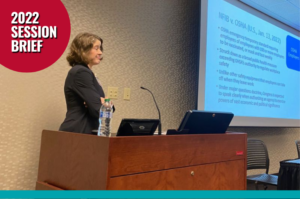By Lucy Swearingen
 Over two years after COVID-19 after hit U.S. shores, its impact the American legal and political system are still playing out.
Over two years after COVID-19 after hit U.S. shores, its impact the American legal and political system are still playing out.
“There seems to be greater political reactivity around Covid,” said Elizabeth Weeks, associate provost for faculty affairs and Charles H. Kirbo Chair at the School of Law at the University of Georgia.
Weeks led a session at the annual State of the Public Health conference in Athens, Georgia on October 27, 2022, dissecting the new political landscape in the wake of varied responses to the pandemic by the federal government.
During her presentation, Weeks emphasized how the response to the Covid crisis by federal officials has fluctuated between initial indifference, to primary concern, and now seeming disregard.
“I keep saying we’re certainly not done with the pandemic,” she said. “Although, Biden says it’s over, which created a whole firestorm in these lawsuits,” said Weeks.
Divided public opinion on the government’s response to Covid, and in particular vaccine mandates, raised questions about the state of various health mandates enforced by the federal government.
Common oppositions to vaccine mandates for Covid-19 center on the concern of too much involvement from the government into private lives.
“You can’t take it off,” she said, comparing a required vaccine to required safety equipment in the workforce.
Weeks invited her audience to wonder what effects will last after the pandemic. Has a new standard potentially been set?
“Whether we’ll begin to see a stronger presence of federal authority, a lasting imprint, is what I’m really interested in,” Weeks said.
Since Covid-19 is a moving target as described by Weeks, it’s hard to predict how these mandates will continue to shift; however, Weeks predicts that this topic of government and mandates on Covid-19 will continue to evolve with changing season.
Though Weeks leaves no explicit takeaways, she hopes to see a stronger presence of federal authority in public health spaces.
“It’s difficult right now because of where we are, you know, as variants continue to move over the winter. We may see other attempts that are still kind of at play,” she said.
